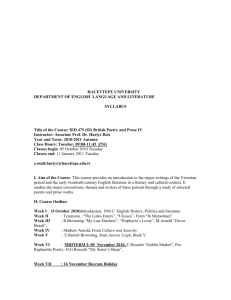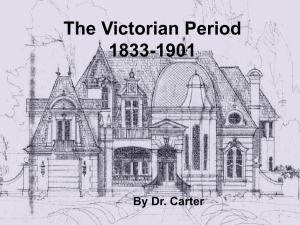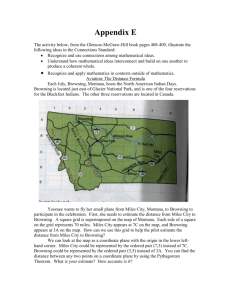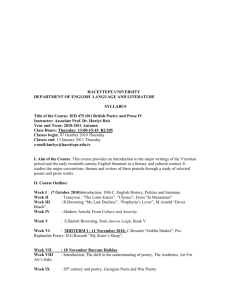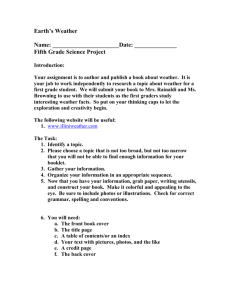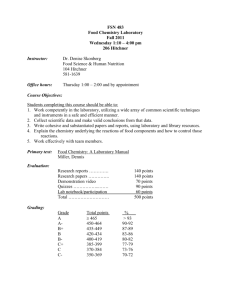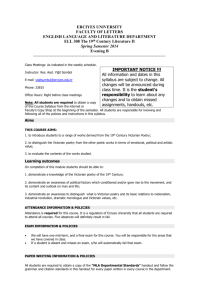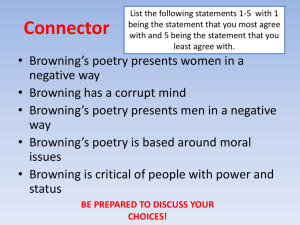Robert Browning
advertisement
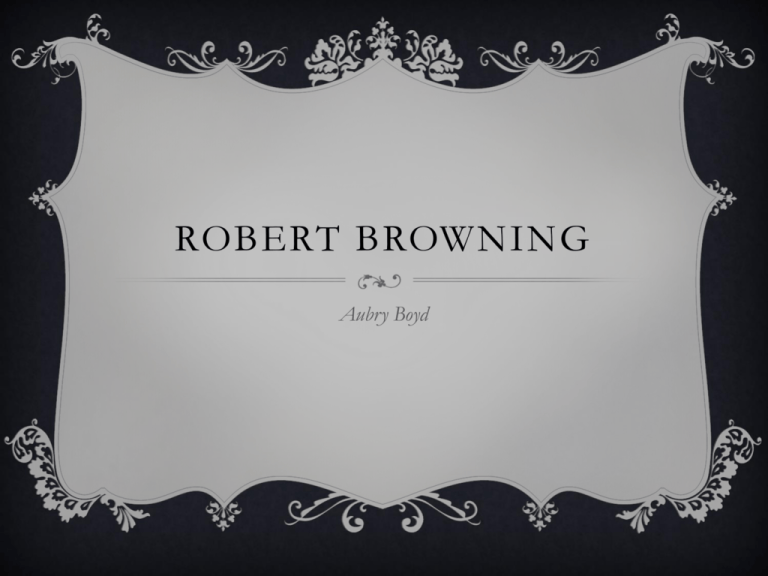
ROBERT BROWNING Aubry Boyd As you can clearly see from this picture, Robert Browning was a pretty kickin’ dude. I mean, look at that intense stare! Heck, even his beard was intense, so intense, that he had to hold it in place so it didn’t attack the poor sod who was drawing him. Man. That guy must’ve been awesome at parties. IN THE BEGINNING At the age of 19 Browning published his first poem, it was deeply personal and the ridicule he received caused him to avoid personal poetry afterwards. As a result, most of Browning’s poetry is very far removed from himself, using different narrators and characters. After his failed first foray into poetry, Browning moved onto theatre… BROWNING AND THEATRE I’m not going to put this kindly, Browning’s theatrical work was less than stellar. The dude’s dead, I’m sure he won’t mind me telling the truth. The only good that came out of Browning’s worth in theatre is the introduction of a new medium for him, the Dramatic Monologue. This is one of his most impressive mediums, and one he used often. HOW CLICHÉ Browning fell in love with a Miss Elizabeth Barrett and they eloped to Italy to escape her possessive father. Both poets thrived in their idyllic marriage, producing many volumes of poetry during this time. Browning produced his most memorable volume of poems during this time, Men and Women. The happiness ended in 1961 when Elizabeth died. It was only after this that Browning began receiving the recognition he deserved for his poetry. I have no idea what is with that hair…I guess she shared her husband’s fondness for insane hairdos. LATER LIFE After the death of his wife, Browning continued producing poetry. Browning’s longest poem was written in 1868, The Ring and the Book. Which is about a gruesome murder trial in seventeenth century Rome. Browning continued to write about darker and more serious themes until his death in 1889. THEMATICALLY Thematically Browning’s poetry ranged from dark/morbid to the idyllic poetry produced during his time in Italy with his wife. Later in life his poetry switched to an argumentative stance, likely due to his admirers who were generally unqualified to critique his poetry. THEMATICALLY (CONT.) Browning also discussed major philosophical issues in his poetry, such as religion and the “development of a human soul”. It was because of this focus on philosophy that he gained one of his two followings, those that considered him a philosopher and religious teacher who spoke of religious doubts and truths. THE POSSE Browning had two main groups of admirers, though the two admired him for two very different reasons. The first considered him a philosopher who solved issues of religious doubt among other poets of the time. The second group revered him less for his religious strides and more for his style (not the beard, unfortunately). Most notably, the Dramatic Monologue. TOO LONG; DIDN’T READ? TL;DR: Browning was a pretty awesome poet. He produced a metric ton of poetry. His contribution to poetry was his development of the Dramatic Monologue, which, after his use came into use by other poets. Browning was less of a Victorian poet, and more of a forerunner of 20th century poetry – although his style and energy are purely Victorian. BIBLIOGRAPHY Robert Browning. The Norton Anthology: English Literature. Eighth Edition, vol. E. Ed. Greenblatt, S. Norton & Company: New York, 2005. Pgs. 1248-1256 : Biography and Early Life "Selected Websites on Robert Browning's Life and Works." Biography in Context. Detroit: Gale, 2008. Gale Biography In Context. Web. 23 Mar. 2011. : Biography and Contribution Why are you still here? THIS IS THE END.
